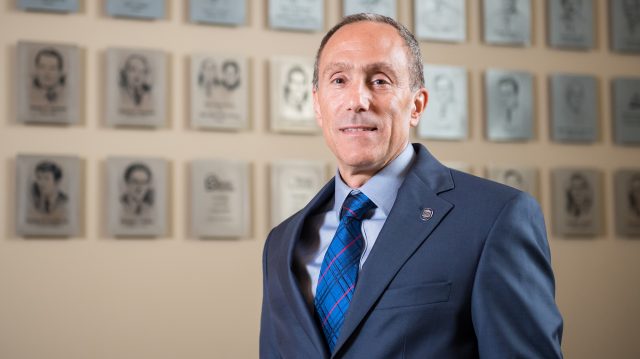
In honor of his work to develop new biomedical technologies, UM engineering Dean David Puleo has been inducted as a fellow of the National Academy of Inventors. Photo by Megan Wolfe/Ole Miss Digital Imaging Services
OXFORD, Miss. – David A. Puleo, dean of the School of Engineering and professor of biomedical engineering at the University of Mississippi, has been inducted as a fellow of the National Academy of Inventors.
Puleo is among 115 inventors elected as 2020 fellows by the NAI, which recognizes and encourages inventors with patents issued from the U.S. Patent and Trademark Office, and one of 11 chosen from the Southeastern Conference. The new fellows’ ceremony took place Nov. 3 during the academy’s 10th annual meeting in Tampa, Florida.
The organization’s mission is to enhance the visibility of academic technology and innovation and translate the inventions of its members to benefit society.
“I am flattered that my colleagues nominated me for fellowship in the NAI, and my induction is a great reflection of the efforts of my students and collaborators during my career,” Puleo said. “My membership provides the opportunity to bring recognition to some of the outstanding innovators and their work at Ole Miss.
“I look forward to seeing my Ole Miss colleagues recognized for their impressive technological innovations that positively affect lives across the state, nation, and world.”
Election to NAI fellow status is the highest professional distinction accorded to academic inventors who have demonstrated a prolific spirit of innovation in creating or facilitating outstanding inventions that have made a tangible impact on quality of life, economic development and the welfare of society.
“Ole Miss researchers create technologies that have impact in many areas, from health care to the environment to national defense,” said Josh Gladden, vice chancellor of research and sponsored programs. “Dean Puleo’s induction into the National Academy of Innovators represents yet another level of recognition for the outstanding research being conducted here.”
The 2020 NAI class, which has made a notable impact in a variety of fields, represents 125 research universities and governmental and nonprofit research institutes worldwide. The inductees are named inventors on nearly 4,000 issued U.S. patents.
Puleo’s inventions provide improvements in the repair and regeneration of tissues, such as bone, cartilage and tendons.
One of his technologies is intended to treat large defects in bone caused by trauma, whether a warfighter injury or a civilian car accident. “Polymeric Prodrug” (U.S. Patent No. 9,433,638) provides a polymer that is composed of a bone-promoting drug and that can be formed into solid implants or 3D scaffolds.
While the biomaterial slowly degrades following placement in the defect site, the released drug molecules encourage healing of the injury.
A second invention could benefit athletes or even “weekend warriors” who injure a meniscus, a cartilage-like cushion in the knee joint. Such small tears are typically treated by cutting away free-floating pieces, even though the loss of tissue can lead to arthritis.
“Crosslinker Enhanced Repair of Connective Tissues” (U.S. Patent No. 10,278,947) describes, among other forms, a patch that releases a chemical that meshes the damaged tissue to restore mobility.
More than 1,000 NAI fellows have generated aome 11,000 licensed technologies and companies, created more than 1.4 million jobs and generated some $190 billion in revenue.
Puleo’s time in higher education includes 27 years at the University of Kentucky before joining the UM engineering school in 2018. He is a renowned biomedical engineer with research expertise focused on using biomaterials for tissue regeneration in dentistry and orthopedic surgery.
He is a fellow of the International Union of Societies for Biomaterials Science and Engineering, the Biomedical Engineering Society and the American Institute for Medical and Biological Engineering. A member of the Omicron Delta Kappa and Phi Kappa Phi honor societies, Puleo received UK’s Excellence in Teaching for Biomedical Engineering in 2011, 2013 and 2015 and the Dean’s Award for Excellence in Research in 2013.
As a researcher in the area of regenerative biomaterials, Puleo has served as principal investigator and co-investigator of federally and privately funded grants and contracts totaling $13.5 million. His research has led to nearly 17 intellectual property disclosures, patent applications and patents, plus a start-up company.